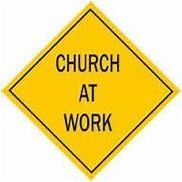 The Work God Gave the Local Church
The Work God Gave the Local Church
Steve Klein
 God is the Master designer. We need only look at the physical universe to realize this. Psalm 19:1 tells us that, “The heavens declare the glory of God, and the firmament shows His handiwork.” The intricate and marvelous design of the creation shows the wisdom of God. “O LORD, how manifold are Your works! In wisdom You have made them all…” (Psalm 104:24). Of course, God’s wisdom can be seen in other things He has designed — like the church. Ephesians 3:10 teaches that the “manifold wisdom of God” is made known through the church.
God is the Master designer. We need only look at the physical universe to realize this. Psalm 19:1 tells us that, “The heavens declare the glory of God, and the firmament shows His handiwork.” The intricate and marvelous design of the creation shows the wisdom of God. “O LORD, how manifold are Your works! In wisdom You have made them all…” (Psalm 104:24). Of course, God’s wisdom can be seen in other things He has designed — like the church. Ephesians 3:10 teaches that the “manifold wisdom of God” is made known through the church.
God is the Creator and Designer of the local church, too. His wisdom is seen in the way the church is designed to work just as it is seen in the way the physical creation is designed to work. Men cannot improve upon God’s designs. At our best, we learn to read the blueprints and follow them.
Unfortunately, many fail to recognize this when it comes to the local church. They view the local church as some sort of free-form association of Christians, whose own members are at liberty to determine its form and function — how it will work and what it will do.
The New Testament clearly reveals that local churches are all to follow a single God-given pattern. Paul’s first letter to the church at Corinth is an obvious effort to bring that church into compliance with the blueprint God has for every church. Paul told the Corinthian church that he sent Timothy to them to “remind you of my ways in Christ, as I teach everywhere in every church” (1 Corinthians 4:17). Notice that the “ways” Timothy would remind the Corinthians of were the same things Paul taught everywhere in every church. Later in this letter, as Paul sets down several rules governing conduct in worship assemblies, he explains that “God is not the author of confusion but of peace, as in all the churches of the saints” (1 Corinthians 14:33). The church at Corinth was expected to conform itself to the same standards as every other church. There is plainly a single pattern every church must follow. Call such a view “narrow” or “monolithic” if you will, but it is what the Scriptures teach.
The focus of this current article is the work God has given local churches to do. What is it that every local church is to do? For what purposes has God designed the local church? What does HE want it to accomplish? Only when we have the correct answers to these questions will we have God’s wisdom at work in the local church. Only then will we have a ready answer to questions like “Should the church do this?” or “Should the church do that?” The answer will be, that the church should do its God-given work — nothing less, nothing more — and that work is…
Evangelism
The first work God has given local churches is evangelism. The church at Thessalonica was praised because from it “the word of the Lord has sounded forth” (1 Thessalonians 1:8).
Here is the pattern for every church! Here is a mission we must not lose sight of! Yet some do. An extreme illustration may be seen in a story I read some time ago about a little old lady who visited Westminster Abbey. Unimpressed by the tour guide’s comments about the architecture and history of the place, she broke in and said, “Young man! Stop your chatter and tell me has anyone been saved here lately?” Too many local churches fail to appreciate the duty they have to reach out to the lost with God’s word. So much time and energy is spent on keeping house, on impressing and serving themselves with purely human endeavors, that they lose sight of the vital soul-saving work with which God has charged them.
Just as churches sometimes lose sight of the soul-saving mission God has given the church, they also sometimes lose sight of God’s plan for accomplishing that mission. According to God’s plan, local churches may spread the Word through several means. They may send out evangelists from among them like the church at Antioch did (Acts 11:20-24; 13:3; 14:25-27). They may support evangelists financially, like the Philippian church and others did (1 Corinthians 9:14; 2 Corinthians 11:8; Philippians 4:15-16). They may invite unbelievers into their worship assemblies to hear the word, as was apparently the practice of the Corinthian church (1 Corinthians 14:24). However, men have devised many other schemes ostensibly to do the work of evangelism. Missionary societies and sponsoring church arrangements top the list of human designs that are not part of the work God designed for the local church. You just can’t find them in God’s blueprint — the Scriptures.
Edification
Local churches must actively involve themselves in the work of edification. “Edification” refers to building up and strengthening those who are Christians. This is one of the primary reasons that local churches assemble together for worship. In 1 Corinthians 14:26, as Paul by inspiration regulates these assemblies, he commands, “Let all things be done for edification.”
Edification, it should be carefully noted, is not doing whatever we want to do to make one another “feel good.” Rather, it is doing what God has told us to do to make one another stronger, better, and more faithful. Singing, praying and partaking of the Lord’s supper are God-given means of accomplishing edification in the church (1 Corinthians 14:15; 11:18-34). So is the preaching of God’s word (Acts 20:7, 32).
Pot-luck suppers, Christmas parties, pageants, rock bands, Elvis-impersonator concerts and basketball games are not the edification God planned for the church, despite the fact that many churches include these things in their “work.” The edification to be done by the church comes in, from and through God’s word (Acts 20:32). It involves instruction, exhortation, correction, reproof, rebuke, and even withdrawal (2 Timothy 3:16; 1 Corinthians 5; 2 Thessalonians 3:6). It does not entail every self-serving, feel-good activity men can think up.
Helping Needy Saints
As we’ve seen, churches are designed to meet man’s spiritual needs in God’s way, according to His plan. In general, we may also observe that God designed the world so that, through His providence, men are individually able and responsible to work in order to fulfill their own physical needs (cf. Genesis 3:19; 1 Timothy 5:8). However, famine, natural disaster, economic crises, death of a provider, or similar problems can prevent individuals from being able to meet their physical needs. In such circumstances, God expects His children individually to do what they can to help (James 1:27; Galatians 6:10; Ephesians 4:28, etc.).
God perhaps could have given local churches the work of helping any and all who are in physical need as well. But the simple fact is that He did not. It may be that He knew such a task would be beyond the resources of the local church. In 1 Timothy 5:16, the reason given for having individual Christians take care of their own widows, rather than having the church do it, is that God did not want the church to be “burdened.”
However, God did give local churches the responsibility of relieving the physical needs of destitute saints. This is the pattern we see followed repeatedly in Scripture. Help to alleviate physical needs was given by churches to “anyone among them who lacked” (Acts 4:33-35), to widows among the “number of disciples” (Acts 6:1), to “brethren” dwelling in Judea (Acts 11:26-30), to “the poor among the saints in Jerusalem” (2 Corinthians 8:1-4; Romans 15:25-26), and to “the saints” (2 Corinthians 9:1, 12). Consistently, the pattern is that churches had the work of helping needy saints, never non-saints.
Churches need to concern themselves with doing the work God designed them to do. Far too often for far too long, church work has been driven by human idealism rather than divine wisdom. Typically, men start with a human idea of “good work,” then ask “what’s wrong with it?” And then, if they do not find it specifically condemned in Scripture, they begin to practice it. This process has produced not only the man-made mess known as denominationalism but also division after unscriptural division among churches of Christ. What we need to do is start with God’s design, accept that His way is not only right but also best, and then follow His pattern implicitly. In John 17:4 Jesus said, “I have glorified You on the earth. I have finished the work which You have given Me to do.” I wonder how many churches today could say that they have glorified God by doing the work He has given them to do?
________
Careful with the Word “Miracle”
Gardner Hall
 I see increasing numbers of references among disciples of Christ referring to events in their lives as miraculous, or even asking for a miracle. Perhaps it’s time for a reminder that we don’t live in the miraculous age. That fact almost used to be taken for granted in congregations I know and perhaps for that reason many have neglected to teach on it. Therefore we increasingly see loose usage of the word, perhaps as a result of the influence of postmodernism and its emphasis on feelings over reason.
I see increasing numbers of references among disciples of Christ referring to events in their lives as miraculous, or even asking for a miracle. Perhaps it’s time for a reminder that we don’t live in the miraculous age. That fact almost used to be taken for granted in congregations I know and perhaps for that reason many have neglected to teach on it. Therefore we increasingly see loose usage of the word, perhaps as a result of the influence of postmodernism and its emphasis on feelings over reason.
By definition, a miracle involves an act that violates the laws of nature, in many cases the instant healing of permanent and visible defects (John 11; Acts 3:2; 13; Jn. 9, etc.). Sometimes miracles were supernatural signs such as walking on the water, turning water into wine, feeding the 5,000, etc.
What is marvelous is not necessarily a miracle. The design of our body and especially our brain with the amazing ability to fight disease, give birth, and invent medicines is a work of God that shows His infinite intelligence. But the wonderful function of our bodies isn’t a miracle in the biblical sense.
The danger in applying the term “miracle” to what is not truly miraculous is a cheapening of the concept. If we apply the word to gradually getting better from an illness or to having a tumor shrink with treatment, unbelievers will begin to see “miracles” as no big deal, but something that commonly happens among all people as well as believers. We don’t want to cheapen the impact of the true miracles of Jesus and the apostles! Therefore, let’s be discreet and avoid applying that word loosely.
__________
“You Have Fallen from Grace”
(Galatians 5:4)
Mike Johnson
Can a child of God fall from grace? Galatians 5:4 plainly says to those who are Christians that they can fall from grace. It seems some were teaching it was necessary to obey certain aspects of the old law to be saved, such as circumcision. Paul told them (v. 1), “Stand fast therefore in the liberty by which Christ has made us free, and do not be entangled again with a yoke of bondage.” He further told them (vs. 2-4) that if they were circumcised, Christ would profit them nothing, and they would be debtors to keep the whole law. He added, “…you who attempt to be justified by law; you have fallen from grace” (4). Could it be any clearer? A child of God can fall from grace.
Most would admit that those under consideration were in a lost state. So how would the “once saved, always saved advocate” explain this passage? Typically, they say that a Christian is not actually under consideration in these verses.
Paul clearly is addressing Christians instead of non-Christians in these verses. Earlier in Galatians, such passages as 1:2, 4, 6; 3:13, 27-29; 4:5-7 make this clear. Chapter 4 concludes by discussing the allegory of Hagar (who depicts the old covenant) and Sarah (who represents the new covenant). Verse 31 says, “So then, brethren, we are not children of the bondwoman but of the free.” Then, in 5:1, Paul said, “Stand fast therefore in the liberty by which Christ has made us free, and do not be entangled again with a yoke of bondage.” These had been made “free” and had escaped the “yoke of bondage” (the old law). They were in danger of being “entangled again.” He is speaking to Christians, and these Christians, if they went back to the old law, would fall from grace.
Further, these people fell from grace. How can people fall from something they were never in? Also, salvation is by “grace” (Eph. 2:8-10). If we fall from grace, how then can we be saved? We can fall from that which saves us.
With God’s help, Christians must resist Satan (1 Pet. 5:6-9; Jas. 4:7) and grow spiritually (2 Pet. 1:5-11) so that we will never fall. When we sin, we seek the forgiveness of God (Acts 8:22).
__________
A Farmer’s Greatest Sermon
The farmer and his family, after a hard year of typical farm work, were rewarded with an unusually fine crop of grain. There were happy days ahead.
Just a few days before harvest came a terrible wind and hail storm. The entire crop was destroyed! After the storm was over, the farmer, with his wife and little boy at his side, went out to the back porch to view the field and the damage.
The little boy looked at what was formerly a beautiful field of wheat, and tearfully looked up at his dad expecting to hear words of despair.
All at once his father started to sing softly, “Rock of Ages, cleft for me, let me hide myself in thee….” Years later, the little boy now grown said, “That was the greatest sermon I have ever heard.”
The farmer had lost a grain crop, but because of his faith, manifested in great trail, he had gained forever for the Lord the soul of his son. The son saw the faith of a godly man in practice!
Author Unknown
__________
Saved by Saving
A man was walking over the mountains through a terrible snowstorm. He gradually grew colder and colder until at last, he stumbled and fell. He said to himself, “I shall never be found. This is the end.”
He thought he was too weak to rise, but as he fell, his hand fell across the body of another man who had fallen in the same snowdrift. This poor man was now unconscious and very near death’s door. The man who had just fallen, exhausted and cold as he was, said to himself, “I can’t let him die like this,” and as he bent over the prostrate form of the first traveler, he began to briskly rub his face and his hands. By and by the man’s eyes opened. They then helped each other to a place of safety. He had saved another’s life—but he had also saved himself. Just so, we save our souls by saving others.
Author Unknown
____________________________________________
Sermon
Audio
Three Dispensations of Time
Bill Hall
(7-28-24)
====================================================
Editor: Mike Johnson
www.seekingthingsabove.org

